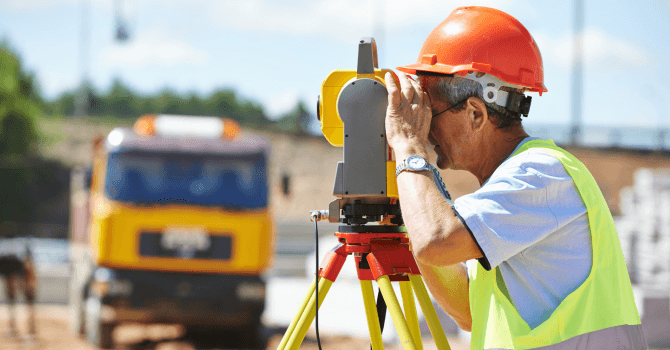
This a promising career path for those who have a love of the outdoors, excellent attention to detail and ease of using computers; if so, you may be interested in working as a land surveyor.
The job is vital for maintaining land development, as this profession performs jobs such as topographical mapping, boundary surveys as well as construction staking. Now, this may all sound exciting but what does it take to follow this career path?
Land surveyors work with many different professions including engineers, architects, as well as builders to produce a description of the Earth’s surface. In this article, we’ll offer a detailed description of what it takes to be a land surveyor as well as some benefits and specifics of this profession.
Working in Renovation: Land Surveyor
What's a land surveyor?

source: unsplash
As briefly mentioned in our introduction, the work of a land surveyor is crucial for the development of land. Over the course of history, land surveyors have played a major role in vital discoveries and uncovering information about our earth.
Today, a land surveyor works to conduct field research for building and architectural projects to determine the exact location of land features and formations. Working as a professional in this arena will allow you to choose from a variety of specializations that move well beyond fieldwork. A land surveyor uses math as well as data that is gathered from sources including global positioning systems, and observational and specialized tools in order to measure the distance and boundaries of the land. Specific jobs that a land surveyor takes on could include the following:
Observe and record elevations and depressions in an area of land;
Calculate coordinates of geographical features;
Verify the accuracy of the collected data;
Identify land boundaries;
Prepare maps, sketches and reports;
Understand the Global Positioning System (GPS) and Geographic Information System;
Refine skills to keep up with technological advancement.
Educational Journey to Land Surveying
Becoming a land surveyor won’t happen overnight. A university degree is necessary for this profession. However, this career path starts before university, and preparation will start in high school. High school courses such as trigonometry, algebra, geometry, drafting classes or other advanced math courses can help to set you in the right direction. In specific instances, a high school diploma with advanced math credits could gain the right candidate an apprenticeship before pursuing post-secondary education.
As mentioned, many in this profession do have a university degree. At this level, you’d be looking for a major in one of the following fields: cartography, surveying, geography, computer science, and engineering. Overlapping in two or three of these areas would be considered a serious asset. Certain universities will offer a surveyor-specific degree.
This will give you the practical skills to do fieldwork while also offering some theory for a deeper understanding of the subject. Some possible courses could include land information systems, satellite surveying and remote sensing, real estate law, statistical methods and survey research.
Land Surveyor's License
Following the completion of a degree, it’ll be necessary for you to obtain a surveyor's license. The requirements for this license will vary from place to place, city to city. In most scenarios, a certain number of hours of experience will be required, and this will include training in land surveying as well as professional experience in the field. Without a license, it’s still possible to work as a land surveyor, though usually in the position of technician or technologist while under the supervision of someone with a license.
Although holding a university degree and practicing the proper math skills is important, fieldwork is essential to getting a surveyor's license. This is because you’ll be able to practically apply the theoretical knowledge you’ve learned in university, and this can only be done while out on the land gathering information by way of physical evidence and on-the-ground research.
Who hires land surveyors?

source: unsplash
When it comes to the career path of the land surveyor, the possibilities for employment are abundant. Various organizations will utilize the skills of a land surveyor, and they include:
Construction and mining companies;
Survey companies;
Real Estate and development agencies;
Geomatics firms;
The government, including federal and provincial.
Land Surveyor Salary
As a land surveyor, your salary can vary widely in relation to the license you hold as well as how much experience you have and who you’re employed by.
Depending on the province, the hourly wage of a land surveyor can range anywhere between $27 to $45 an hour, whereas a salaried position could be in the range of $59,000 and $100,000 annually. Obviously, your salary will greatly depend on the amount of experience you have in the field itself.
Being a Land Surveyor in Quebec
As is the case for a lot of renovation trades in Quebec, it's required to obtain a valid RBQ license if you are operating in this province. To work as a land surveyor, you need a 2.7 license (site work). For the consumer, working with a land surveyor who has a valid license is not without importance. This allows them to obtain a $20 000 compensation if they have an issue with a licensed contractor who is specialized in land surveying.
Looking for something else?
Related articles
The latest industry news, interviews, technologies, and resources.

Editorial Team
•20 Jun 2024
Carpenter-joiners are as important as ever on construction sites, given that building and erecting wood-made structures are, to this day, an integral part of all new construction projects, whether for commercial or residential projects. If this trade has piqued your interest, you no doubt want to know more about it! Keep reading to learn everything that could be of interest about becoming a carpenter-joiner in Canada.

Editorial Team
•08 Nov 2023
RenoQuotes.com followed home renovation contractor Ali Nazar on the job at the site of a basement renovation project in Montreal. Check out this interview to know more about the subject of basement renovations.

Editorial Team
•08 Nov 2023
Kitchen floors covered in ceramic tiles are a durable and low-maintenance option for any home. However durable, one slip of a hot pot could easily cause a crack in the tiles, leaving you with a partially broken floor. Luckily, this is an easy fix that can be done without destroying the entire floor.

Editorial Team
•03 Jun 2025
Underpinning is a technique that is essential to ensure the stability of a building whose solidity is compromised due to a natural disaster, upper floor renovations with excessive added weight to support, or due to a foundation being poorly adapted to the ground where it is set.

Editorial Team
•04 Sep 2024
As more of us shift to working from home, managing our energy consumption has become crucial. Not only does it help in reducing our monthly bills, but it also plays a significant role in lessening our environmental impact.